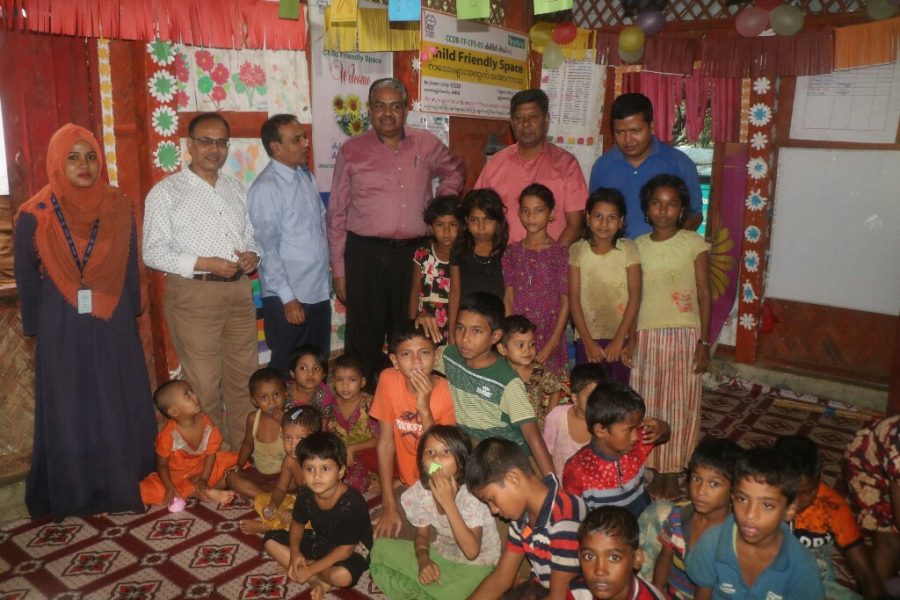The plight of Rohingya refugees in Cox’s Bazar Camps is a shame on humanity, says Mathews George Chunakara
 CCA Solidarity Visit Team with Rohingya refugee children at a Child-Friendly Space (CFS) in a refugee camp at Cox's Bazar
CCA Solidarity Visit Team with Rohingya refugee children at a Child-Friendly Space (CFS) in a refugee camp at Cox's Bazar
COX's BAZAR, Bangladesh: Christian Conference of Asia’s General Secretary Dr Mathews George Chunakara visited the Rohingya refugee camps in Cox’s Bazar region of Bangladesh and stated that the manner in which Rohingya ethnic minority people are being treated in camps is a shame on humanity as a whole.
“The plight of more than a million refugees driven out from their homes in the Rakhine State in Myanmar and who are now forced to live in inhuman conditions in refugee camps in Bangladesh reflects the world’s failure to prevent a humanitarian crisis,” the CCA General Secretary stated.
The solidarity visit of the CCA General Secretary to Myanmar’s Rohingya ethnic minority refugee camps in Bangladesh was part of the CCA’s commitment to accompany people and communities in vulnerable situations.
Accompanied by CCA Treasurer Augustine Deepak Karmakar and the General Secretary of the National Council of Churches in Bangladesh (NCCB) Rev David Deepak Doss, the CCA General Secretary’s visit was facilitated by the NCCB and the Christian Commission for Development in Bangladesh (CCDB), a leading development and humanitarian aid NGO initiated by the World Council of Churches almost five decades ago.
The CCDB facilitates ‘Child-Friendly Space’ within the camp and also provides assistance with solar energy-powered electricity and pumps for drinking water facilities within the camps.
The social workers of the CCDB who assist the people in the camp explained the deplorable conditions of the refugees. They reported the official statistics by government agencies that at least 60 children were born every day in the camps. They also said that the heavy monsoon rain triggered landslides and floods in most of the 32 refugee camps, and that this was a common scenario. Under these circumstances, children were especially vulnerable to water-borne diseases.
Dr Mathews George Chunakara explained that the CCA team visited the camps amidst heavy rainfall, and observed the flooding due to the erosion of top-soil caused by deforestation on the hill-sides. He also added that the CCA team was told that much of the water was unclean; and due to the scarcity of safe drinking water, the risk of infection was high.
More than a million Rohingya ethnic people, a majority of who are Muslims, had to flee Myanmar around two years ago, following the ethnic conflicts that erupted in Myanmar’s Rakhine state. The coordinated massacre of the Rohingya carried out by the military and the anti-Rohingya militants was classified by the United Nations as genocide, in which a large number of people were tortured, raped, and murdered; their houses burnt; and their livelihoods destroyed. The Rohingya refugee crisis is one of the world's most devastating humanitarian disasters.
Myanmar’s military government had been accused of restricting the movements and rights of its minority ethnic groups since the 1960s, and the predominantly-Muslim Rohingya had been particularly and systematically targeted.
The Citizenship Law of Myanmar that has been enforced since 1982 denied citizenship rights to the Rohingya, despite them having lived in Myanmar for centuries; and this effectively rendered them stateless.
The ethnic minority’s rights to marriage, education, health care, free mobility, and employment were severely restricted. Many were coerced into labour and had their land seized arbitrarily; they were forced to live in extreme poverty.
The Bangladeshi government officials have repeatedly stated that Bangladesh, the world's most densely populated country, does not have the capacity to accommodate the influx of the large number of Rohingyas.
The Bangladesh government feels it is not obliged to host these refugees indefinitely, and the country is not even a signatory to the 1951 UN Refugee Convention.
The President of the NCCB Joyantha Adhikari and the General Secretary Rev. David Deepak Doss have urged the churches in Asia to be mindful of the plight of the Rohingyas and their miserable living conditions in Bangladesh’s refugee camps.










